A Disorder Nobody is Talking About
It can affect over 15 million Americans in any given year. It is misdiagnosed almost 90% of the time by doctors, psychologists, and other mental health care professionals. (http://www.socialphobia.org/) It can cause a person to be unable to hold a job, or even get one. In extreme cases, it can even prevent a person from leaving their house! This disorder, by its very nature, inhibits its sufferers from seeking help because they often believe they are alone in the world in their suffering. What is this mysterious psychological disorder that nobody is talking about? It is social anxiety disorder, sometimes referred to as social phobia. Social anxiety disorder manifests itself in different social situations and is difficult to diagnose, but fortunately this disorder can be treated effectively.
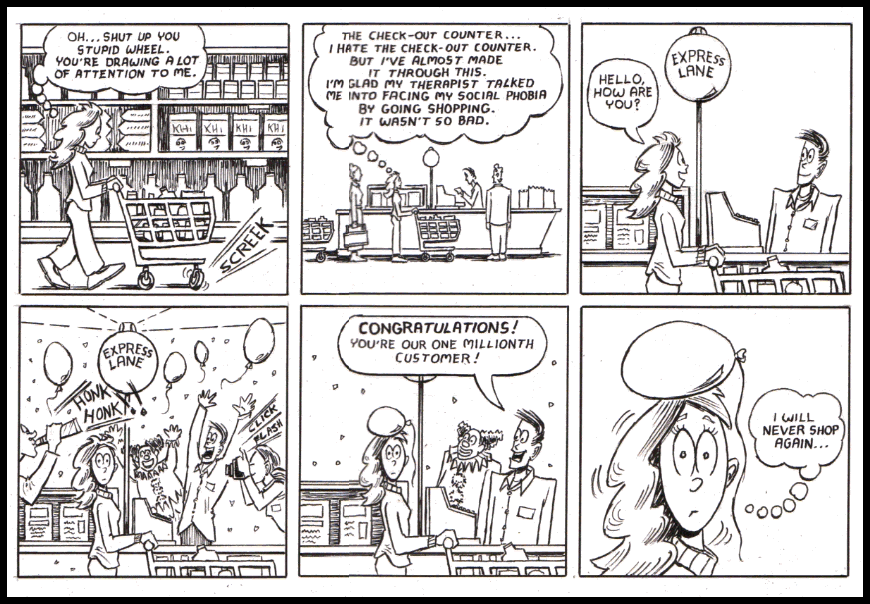
Social anxiety disorder has a variety of symptoms, but there are two things that are shared among all people who suffer from it. The first part is the oppressive fear of being criticized, judged, or evaluated by other people in certain social situations. The other part is the knowledge that these fears are basically irrational, but this does not prevent the crippling anxiety. (http://www.socialphobiaworld.com/) They know that other people are not out to humiliate or embarrass them, yet they still feel anxious. One characteristic of this disorder is that the victims can suffer from anxiety in any combination of a variety of social situations. It can happen when dealing with authority, giving a speech, meeting strangers, going to parties or other social events, conversing with the opposite sex, going out in public, making simple eye contact, going to an interview, being the center of attention, eating and drinking in front of other people, being introduced or introducing oneself, etc. A person may be perfectly fine in one situation, yet have nervous knots in another. For example, a brilliant public speaker may be overwhelmed with anxiety when talking to strangers one on one.
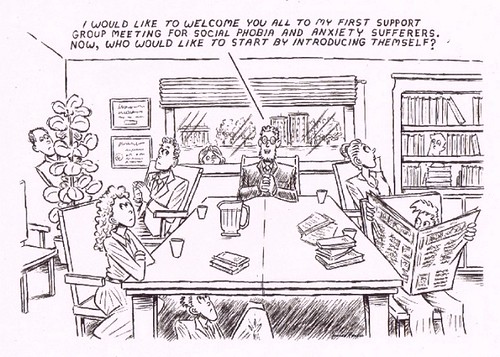
Why is social anxiety disorder so hard to diagnose? For many years, the subject of social anxiety was lumped with other anxiety-related fields of psychology, such as those involving phobias (fear of heights, fear of the dark, fear of public places and situations, etc.) and generalized anxiety disorders. Only recently have certain branches of psychology begun to study this particular disorder in depth. It is also difficult to identify how pervasive this disorder is because the people who suffer from it the worst are also the ones who are difficult to find to conduct studies on. People who suffer from social anxiety may even unconsciously fudge their own personal assessments of themselves in an effort to avoid the extra attention. One report estimates that between 3 to 13 percent of the population suffer in some way from some form of social anxiety, with the large range due to unclear data. (http://www.socialphobiaworld.com/)
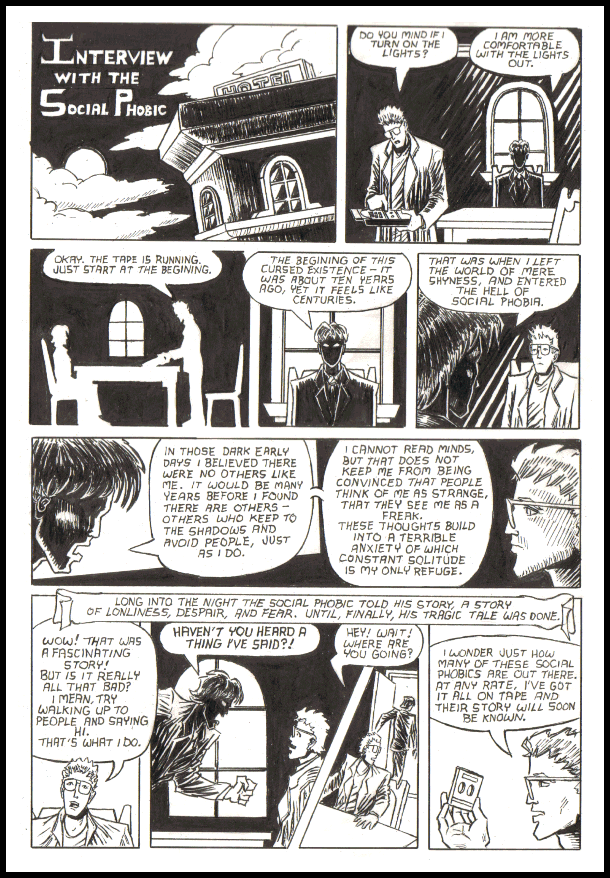
One thing that might not be well known is that everybody experiences social anxiety to some degree. Social anxiety is the product of a person’s desire to make a good impression to other people, and the relative doubt that he or she will achieve a favorable impression. (Understanding Social Anxiety, Leary, 1983) If a person is on the verge of making an important speech, it is natural for them to experience added anxiety because the stakes are higher. A virtuoso violinist will likely feel less anxiety than an untrained violinist when performing in front of an audience because the expert knows that he or she will perform relatively well, whereas the untrained violinist has legitimate doubts concerning his or her ability.

So why would some people have a problem with their social anxiety, but other people function normally in spite of it? For people who suffer from social anxiety disorder, one of the culprits seems to be their own unrealistically high social expectations. They may think that they can please everybody they meet. Since this is an impossible goal, when they fail to adequately impress a person, they take the failure to heart. Fueled by past ‘failures’, they experience more doubt in their following social encounters, doubt that increases social anxiety further. Another culprit is a persistent negative self image. A person can be so convinced that they are doing poorly in a social situation that they focus on the negative feedback they receive, and they barely even notice the positive feedback. (Understanding Social Anxiety, Leary, 1983) In addition, a person can become so preoccupied with being nervous that they cannot concentrate on listening to pertinent information. (ibid) For example, a student in class could be so nervous about being called to answer a question in class that they do not learn the material very well. When the student is called, he or she cannot answer effectively because he or she has not been paying full attention. In the meantime, this failure would further reinforce the idea that the student was not good enough to begin with. It can be a vicious cycle, negative or perceived negative feedback from previous encounters leading to increased doubt of success in future encounters leading to increased social anxiety. (ibid) These factors can eventually lead a person to avoid the social situations which cause their anxiety.
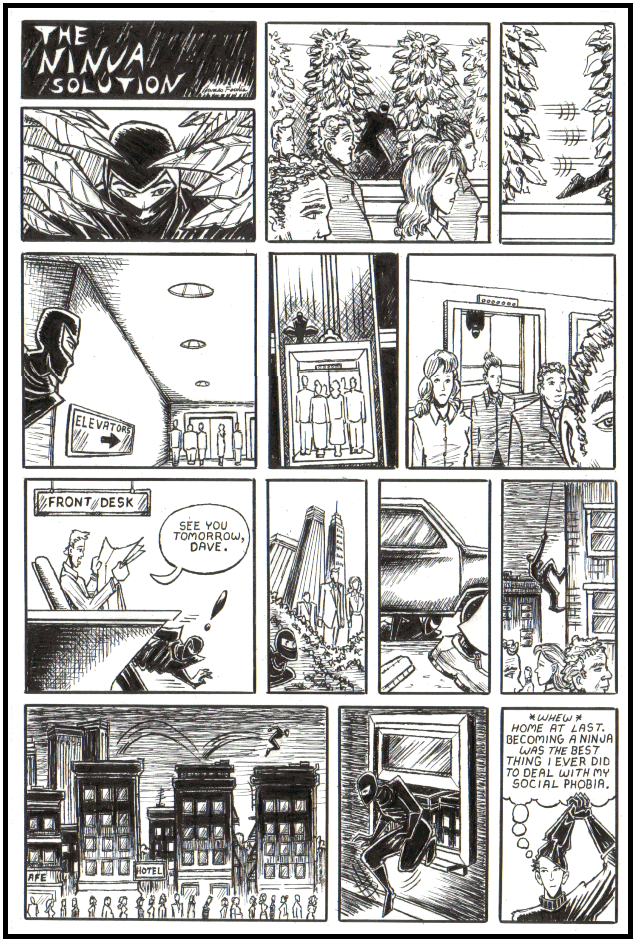
Fortunately, social anxiety disorder can be treated. There are some good news and some bad news when it comes to treating this disorder. The good news is that there are effective ways of treating it to the point that it does not interfere with a person’s life. The bad news is that because the disorder in not well known in the mental health community, it is often mistreated. For example, the normal “face your fears and you will conquer it” treatment a psychologist may employ backfires when applied to someone who has social anxiety. Since there are obviously billions of people on earth, avoiding social situations is practically impossible. People who do not know how to cope with their anxiety have already faced their fears time and time again, and are left the worse for wear.

For some people, just the knowledge that there are more people out there who suffer from social anxiety than they think helps them deal with their anxiety. For the more serious cases, however, the most effective treatment revolves around cognitive-behavioral therapy. It is basically teaching the brain to unlearn the socially crippling negative thought processes and replacing it with neutral, rational thought processes. (http://www.socialphobia.org/) Through repetition, the brain learns to think differently in social situations. This is followed by systematic desensitization, which involves gradually exposing the subject to their anxieties at their own pace. (ibid) Because individuals who suffer from social anxiety often suffer from differing symptoms, it is important that the treatment is tailored to each individual. People who suffer greatly from social anxiety should do their own research on the subject, and seek a specialist in the field.
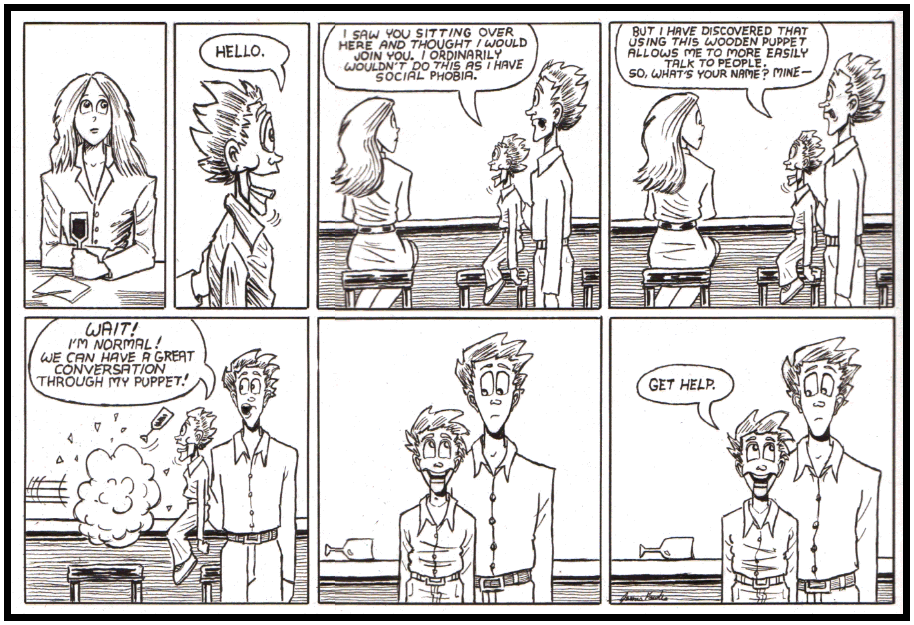
In conclusion, it may seem like social anxiety disorder flies under the radar, but it can be just as crippling as other mental health issues. Thankfully, people who are afflicted are not forced to hide out in their homes forever because there are ways to deal with it. It can be as simple as adopting a more positive image for yourself, or lowering one’s unrealistically high expectations of social performance. Social anxiety is all in your head - which means that you can conquer it if you put your mind to it.
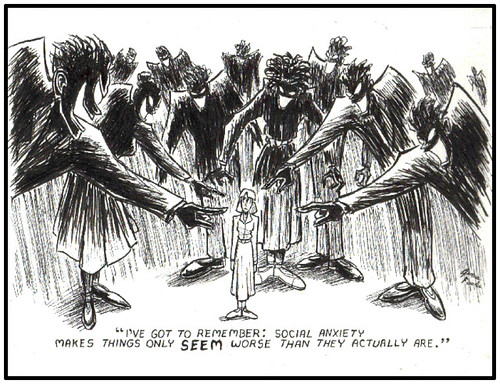

8 Comments:
Very helpful. Thanks
Lots of useful information and great to see social phobia being discussed but I disagree that it's largely overlooked or undiagnosed. Many people don't seek help for this..
Yes, thank you for all the information..it's very helpful and somewhat comforting to read and see things about this..
Thank you..
Great post! I really appreciate this and its good to find lots of helpful stuff here. Well, 9th grader here, and I have social anxiety. Just trying to get better. Thank god I can look people in the eyes. But I'm shy and trying to get out more and still feel self concious now and there is this new thing with me I always feel I have a booger in my nose! Ugh I hate it. Anyways I'm just really praying things get better. Really appreciate this blog entry... its all in my head, right?
Would-be 9th grader here. I dropped out in grade 7. I walk my dog every once and a while (but she doesn't approach other dogs anymore. I think I imprinted my own anxiety on to her...), and I've grown my bangs out so that they can completely cover my face--if I 'need' to.
Very good and entertaining article. Do you can reveal me where you got the funny cartoons concerning the topic?
Very good and entertaining article. Do you can reveal me where you got the funny cartoons concerning the topic?
"I've got to remember: Social anxiety makes things only seem worse than they actually are."
This is kind of a 'technique' that I use to overcome social anxiety. The problem though is when the social-related situation IS bad and social anxiety goes and makes it worse. Back at elementary and high school, I'm one of those students who are bullied around and laughed at for being a loser or being weird. If not, they'd stay away from me as much as possible. "Weird people phobia" is common. Almost everyone has it. And for a social phobic it's a NIGHTMARE.
Post a Comment
<< Home